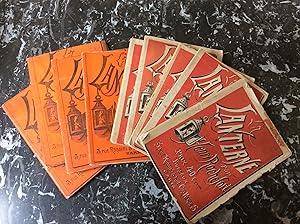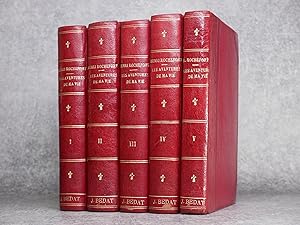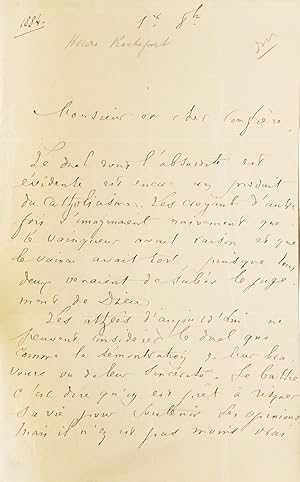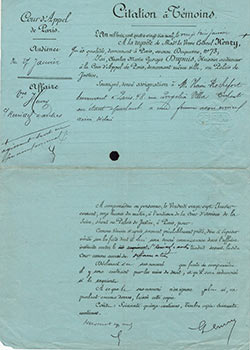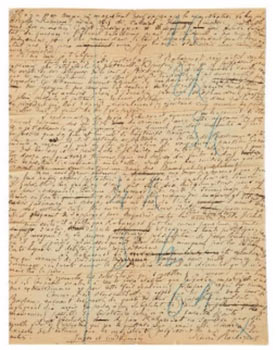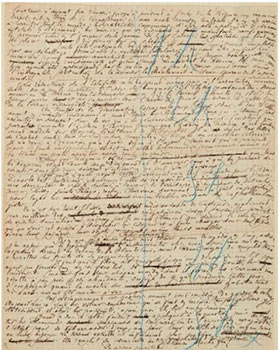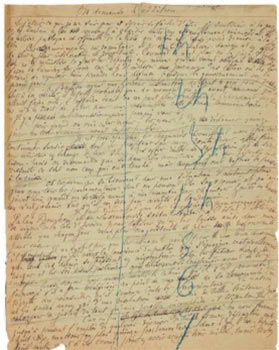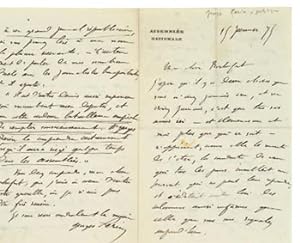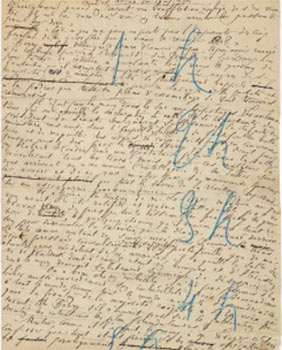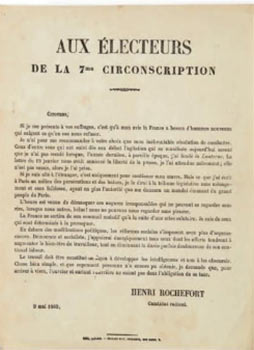ROCHEFORT HENRI DE 1831 1913 (17 resultados)
Tipo de artículo
- Todo tipo de artículos
- Libros (10)
- Revistas y publicaciones
- Cómics
- Partituras
- Arte, grabados y pósters
- Fotografías
- Mapas
-
Manuscritos y
coleccionismo de papel (7)
Condición
Encuadernación
Más atributos
- Primera edición (3)
- Firmado (5)
- Sobrecubierta
- Con imágenes del vendedor (13)
- Sin impresión bajo demanda (16)
Gastos de envío gratis
Ubicación del vendedor
Valoración de los vendedores
-
The Adventures of My Life; Volume 2
Publicado por Wentworth Press, 2016
ISBN 10: 1360131000ISBN 13: 9781360131009
Librería: ThriftBooks-Atlanta, AUSTELL, GA, Estados Unidos de America
Libro
Hardcover. Condición: As New. No Jacket. Pages are clean and are not marred by notes or folds of any kind. ~ ThriftBooks: Read More, Spend Less 1.74.
-
La grande Bohe?me (deuxie?me se?rie des Franc?ais de la de?cadence) (1867) (Reprint) [Leatherbound]
Publicado por Pranava Books, 2020
Librería: S N Books World, Delhi, India
Libro Impresión bajo demanda
Leatherbound. Condición: NEW. Leatherbound edition. Condition: New. Language: fre Leather Binding on Spine and Corners with Golden leaf printing on spine. Reprinted from BK edition. NO changes have been made to the original text. This is NOT a retyped or an ocr'd reprint. Illustrations, Index, if any, are included in black and white. Each page is checked manually before printing. As this print on demand book is reprinted from a very old book, there could be some missing or flawed pages, but we always try to make the book as complete as possible. Fold-outs, if any, are not part of the book. If the original book was published in multiple volumes then this reprint is of only one volume, not the whole set. IF YOU WISH TO ORDER PARTICULAR VOLUME OR ALL THE VOLUMES YOU CAN CONTACT US. Sewing binding for longer life, where the book block is actually sewn (smythe sewn/section sewn) with thread before binding which results in a more durable type of binding. THERE MIGHT BE DELAY THAN THE ESTIMATED DELIVERY DATE DUE TO COVID-19. Pages: 656 Pages: 656.
-
ADV OF MY LIFE V01
Publicado por WENTWORTH PR, 2016
ISBN 10: 1360130969ISBN 13: 9781360130965
Librería: moluna, Greven, Alemania
Libro
Gebunden. Condición: New.
-
La LANTERNE . Les 9 premiers numéros de cette revue .
Publicado por ROCHEFORT, PARIS, 1868
Librería: Lecapricorne, BEAUNE, Francia
Libro Original o primera edición
Couverture souple. Condición: Bon. 1ère Édition. Belle réunion rare des 9 premières revues de ce grand polémiste opposant a NAPOLEON III Volume de petit format broché.
-
Les aventures de ma vie - (les 5 tomes. Edition originale, complet)
Librería: Librairie Laurencier, Bordeaux, AQUIT, Francia
Miembro de asociación: ILAB
Original o primera edición
Paris, Paul Dupont, 1896-1898. Edition originale. 5 vol. in-8 brochés, XII-378-385-366-391 & 330 pp. La couv. du tome 2 porte mention "8e édition" (date de parution 1896). Bon état intérieur : papier jauni et rousseurs d'usage, discrètes et rares. Les couvertures brochées sont dans un état moyen (d'usage) : dos usés et scotchés - rousseurs. A relier."L?an 1896 vit la parution du premier des cinq volumes des mémoires d?Henri Rochefort (c'est-à-dire le marquis Victor Henri de Rochefort-Luçay, 1831-1913) sous le titre Les Aventures de ma vie (Paris, Paul Dupont, 1896-1898). Replet, l'ensemble comprenait 1854 pages. Il faut dire que l?arsouille, qui avait vu du pays et des têtes, en avait à raconter.".
-
LES AVENTURES DE MA VIE.
Publicado por PAUL DUPONT, EDITEUR. 1896-1898., 1896
Librería: Librairie du Château de Capens, Capens, Francia
Original o primera edición
5 TOMES EN 5 VOLUMES IN-8 (12,5 X 18,5 X 15 CENTIMETRES ENVIRON) DE XII + (2) + 378, (4) + 385, (4) + 366, (4) + 391 ET (4) + 330 PAGES, RELIURE D'EPOQUE 1/2 VEAU ROUGE A COINS, DOS LISSE ORNE DE FILETS ET DE FLEURS DE LYS DORES, TITRE DORE, EX-LIBRIS DORE EN PIED: «J. BEDAT». EDITION ORIGINALE DE CES MEMOIRES PAMPHLETAIRES, EN PARTICULIER CONTRE LE REGIME DE NAPOLEON III. DEPORTE EN ENCEINTE FORTIFIEE SUR LA PRESQU'ILE DUCOS A NOUMEA, IL REUSSIT AVEC QUELQUES COMPAGNONS A S'EVADER, SEULE EVASION REUSSIE DE TOUTE L'HISTOIRE DU BAGNE DE NOUVELLE-CALEDONIE. UN CAHIER DEBOITE, SINON BON EXEMPLAIRE.
-
Almanach de la Lanterne pour 1869. (avec) Almanach de la Lanterne pour 1870.
Librería: Antiquariaat Wim de Goeij, Kalmthout, ANTW, Belgica
Miembro de asociación: ILAB
2. Paris, 1869, 1870, in-16°, les 2 almanacs relié ensemble, demi-toile, la couverture du second almanac a été préservée.
-
LANTERNE La ( revue hebdomadaire ) .
Librería: Antiquariaat Wim de Goeij, Kalmthout, ANTW, Belgica
Miembro de asociación: ILAB
3. Paris, puis Bruxelles (depuis le numéro 14), in-16°, fascicules de ca. 60 pp. DISPONIBLE ; Les Numéros 1 à 10 ; 21 à 30 , 41 à 50 , 51 à 60 . Relié en 4 volumes demi-toile d'époque, les couvertures non conservées.
-
Letter from Henri de Rochefort-Luçay to an unknown recipient
Publicado por France, 1884
Librería: The Old Mill Bookshop, HACKETTSTOWN, NJ, Estados Unidos de America
1 leaf, folded to write the letter, accompanied by a smaller envelope. 1 vols. Victor Henri de Rochefort-Luçay, (born in Paris on January 31, 1831, died in Aix-les-Bains on July 1, 1913), better known under the name of Henri Rochefort, was a journalist, playwright and French politician . A great polemicist in the pages of his newspapers (La Lanterne, La Marseillaise, L'Intransigeant), he defended radical and even extremist political options (anticlerical, nationalist, favorable to the Commune, socialist and antidreyfusard) which earned him the nickname of "The man with twenty duels and thirty trials." He managed to escape the prison of Noumea in 1874. In this letter dated 1884, Henri writes to his "cher confrère" it is accompanied by an envelope postmarked Madison Square Station, New York, March 2, 1919, and addressed to WE Colville from Romeyn Benjamin Walter, on which is written the note "Rochefort Henri, Great French Editor" One sheet of grid-lined paper with old folds accompanied by a small envelope with two postmarked stamps. letter is crisp and clear; envelope was opened at right hand side 1 leaf, folded to write the letter, accompanied by a smaller envelope. 1 vols.
-
Lettre autographe signée d'Henri ROCHEFORT (1831-1913).
Publicado por L.A.S. (208 x 133) 1 p., s.l.n.d., à "Mon cher Philibert". Froissée.
Librería: Bouquinerie Aurore (SLAM-ILAB), BELMESNIL, Francia
Miembro de asociación: ILAB
Lettre de remerciement au journaliste Philibert AUDEBRAND (1815-1906) pour son article : "( ) je ne pouvais pas espérer un article aussi charmant et aussi sympathique. Vous êtes un ange et un vrai ami. Les dernières lignes m'ont particulièrement touché. Je n'ai pas besoin de vous dire pourquoi, d'autant plus qu'il y avait du courage à dire ce que vous dites. Merci donc deux mille fois et tout à vous. Henri Rochefort". Journaliste et homme politique français, ROCHEFORT est déporté à Nouméa (Nouvelle-Calé-donie) en 1873, avec Louise Michel, et s'en évade l'année suivante. Boulangiste, il est condamné une 2nde fois à la déportation, en 1889, par contumace, ayant suivi le gal Boulanger dans son exil. On joint 1 photographie originale (140 x 102), portrait de H. Rochefort, avec en-dessous un bas de lettre signée "à vous, Henri Rochefort", tous 2 contrecollés sur carton fort (220 x 130) (coin inf. du support cassé.) ainsi qu'1 carte de visite "Henri de Rochefort".
-
Original "Citation à Témoins" issued to Henri Rochefort, to appear as a witness in the aniti-Drefusard case of Veuve du colonel Henry vs. Joseph Reinach,.
Publicado por Paris: Cour d'appel., 1899
Librería: Wittenborn Art Books, San Francisco, CA, Estados Unidos de America
Manuscrito
Condición: Good. 1 page, partly manuscript. 25 x 17.6 cm.Citation à comparaître délivrée à Rochefort comme témoin dans le procès de la veuve du colonel Henry contre Joseph Reinach, 23 janvier 1899. ., Reinach is best known as the champion of Alfred Dreyfus. At the time of the original trial, he attempted to secure a public hearing of the case, and, in 1897, he allied himself with Auguste Scheurer-Kestner to demand its revision. He denounced in the Siècle the Henry forgery and Esterhazy's complicity. His articles in the Siècle aroused the fury of the anti-Dreyfus party, especially as Reinach was a Jew and was accused by some of taking up Dreyfus's defence on racial grounds.He lost his seat in the Chamber of Deputies and, having refused to fight Henri Rochefort, an anti-Dreyfus journalist, eventually brought an action for libel against the latter. Finally, Dreyfus was pardoned, Reinach wrote a history of the case that was completed in 1905. Henri Dutrait-Croyon's Joseph Reinach, historien (Paris: A. Savaète, 1905), a violent detailed rebuttal of Reinach's history that "became a bible for that anti-Semitic section of French public opinion convinced of the culpability of Dreyfus."[. .Henry was made a knight in the Imperial Order of the Dragon of Annam, received the Colonial Medal, and was made a knight in the Legion of Honor in 1884. He married the daughter of an innkeeper from Peronne in April 1892. The manner in which he accused Captain Dreyfus before the court martial in 1894 earned him the most laudatory remarks from the head of the general staff office. In 1895, he was assessed as being an "excellent servant, with an unwavering enthusiasm and devotion [who] provides the highest services to the section." In 1896, it was noted that he "absolutely deserved to be promoted." In 1897, he was again pointed out as being "an excellent officer: extremely devoted and energetic [who] absolutely deserved the praise he has received from his superiors." He was promoted to lieutenant colonel on 10 November 1897, and he no doubt thought that he would triumph after Esterhazy's acquittal in January 1898 and Zola's conviction the following month.But the one whose hierarchy referred to as "an excellent officer on whom one may count in any circumstances" pushed his enthusiasm too far when he forged false telegrams and a wire meant to compromise Colonel Picquart and, in 1896, a forged letter from the Italian military attaché to his German counterpart. When it was revealed to Captain Cuignet that this letter was a forgery, Colonel Henry confessed and was arrested and put in the Mont Valérien fort on 30 August 1898. He was found around 5:00 p.m. the following day with his throat cut and his razor folded. The head of the general staff office resigned, and the War Minister was changed four times in a month.For Henry's widow, who was born Berthe Amélie Bertincourt in 1872, and for his son, "a little French goy whose father was killed by the Jews," La Libre Parole started a fund that received, in less than a month, 131,000 francs in donations. The 25,000 donors to the "Henry monument" wanted to allow her to take Joseph Reinach to court. Her pension was liquidated in November 1898 for a total of 1,667 francs, but, in two judgments handed down on 12 June 1902 and 28 May 1903, she and her son were each awarded 500 francs in damages for insults to her husband's memory. Provenance: Bibliothèque Philippe Zoummeroff, Crimes et Châtiments. Expertise by Thierry Bodin;Jacques T. Quentin; Benoît Forgeot. .Henri Rochefort, the main anti-Dreyfusard polemicist, was born in Paris on 31 January 1831.The son of the marquis de Rochefort-Luçay-himself a journalist and playwright-Henri Rochefort became an employee of the city of Paris in 1851. A sub-inspector for the Ecole des Beaux-Arts, he resigned to work at Le Figaro before founding his own paper, La Lanterne. A deputy from the Seine department in January 1871, he was sentenced to be deported to New Caledonia after the Commune. He escaped in March 1874, and was amnestied in 1880. He then founded L'Intransigeant, which denounced-in tens of thousands of copies-"parliamentary filth." Reelected deputy in 1885, he resigned the following year when he failed to obtain a general amnesty. He supported General Boulanger, which earned him another conviction from the High Court for "conspiracy against the safety of the State.".He was amnestied in 1895, and joined the ranks of the nationalists and the anti-Dreyfusards, accusing Joseph Reinach of having faked the evidence against Esterhazy. On 13 December 1897, L'Intransigeant published the story of a letter from the German emperor naming "Captain Dreyfus throughout." The governmental refutation met with "only incredulity among the enlightened apostles of the nationalist gospel" (M. Paléologue).In 1898, as president of a marginal French socialist party, Rochefort denounced Jaurès as "a sergeant recruiter in the service of the syndicate of treason." On 18 October, he wrote that his dream would be to line up the judges of the Court of Cassation, have an executioner cut off their eyelids, gouge out their eyes, and then place them on a large pillory with a sign reading "This is how France punishes the traitors who sell her to Germany!".His paper denounced the "syndicate" of the Dreyfusards, and supported the anti-Dreyfusards who, at Rennes, nourished the idea that the captain was the incarnation of treason, calling the line of soldiers who turned their back on Dreyfus to discourage death threats a "dishonor guard."He saw anti-Dreyfusism as a means to attack bourgeois values and Jewish financiers, but refused to write for L'Action Française. The last of his 13,000 articles appeared in La Patrie before his death at Aix-les-Bains in the Savoie department, on 1 July 1913.
-
Original manuscripts by (the later ) Anti-Dreyfusard Henri Rochefort against Ministers Guyot-Dessaigne et Thévenet .
Publicado por France: 1889-1890, 1890
Librería: Wittenborn Art Books, San Francisco, CA, Estados Unidos de America
Manuscrito Ejemplar firmado
Condición: Good. 2 MANUSCRITS autographes signés "Henri Rochefort", [vers 1889-1890]; 1 page in-4 chaque (découpés pour l'impression et remontés). Articles pour L'Intransigeant. La loi des otages, protestant contre "l'aggravation des mesures relatives aux passeports en Alsace-Lorraine" et l'exposition de Berlin. Juges et condamnés, attaque pleine de verve contre les magistrats et le "bon pédéraste Rabaroust, ancien chef de cabinet inodore probablement des ministres Guyot-Dessaigne et Thévenet, hier encore substitut de Quesnay au Tribunal de la Seine, ayant été condamné à un mois d'emprisonnement pour s'être promené dans le bois d'Arcachon pendant que le loup n'y était pas".Provenance: Bibliothèque Philippe Zoummeroff, Crimes et Châtiments. Expertise by Thierry Bodin;Jacques T. Quentin; Benoît Forgeot. .Henri Rochefort, the main anti-Dreyfusard polemicist, was born in Paris on 31 January 1831.The son of the marquis de Rochefort-Luçay-himself a journalist and playwright-Henri Rochefort became an employee of the city of Paris in 1851. A sub-inspector for the Ecole des Beaux-Arts, he resigned to work at Le Figaro before founding his own paper, La Lanterne. A deputy from the Seine department in January 1871, he was sentenced to be deported to New Caledonia after the Commune. He escaped in March 1874, and was amnestied in 1880. He then founded L'Intransigeant, which denounced-in tens of thousands of copies-"parliamentary filth." Reelected deputy in 1885, he resigned the following year when he failed to obtain a general amnesty. He supported General Boulanger, which earned him another conviction from the High Court for "conspiracy against the safety of the State.".He was amnestied in 1895, and joined the ranks of the nationalists and the anti-Dreyfusards, accusing Joseph Reinach of having faked the evidence against Esterhazy. On 13 December 1897, L'Intransigeant published the story of a letter from the German emperor naming "Captain Dreyfus throughout." The governmental refutation met with "only incredulity among the enlightened apostles of the nationalist gospel" (M. Paléologue).In 1898, as president of a marginal French socialist party, Rochefort denounced Jaurès as "a sergeant recruiter in the service of the syndicate of treason." On 18 October, he wrote that his dream would be to line up the judges of the Court of Cassation, have an executioner cut off their eyelids, gouge out their eyes, and then place them on a large pillory with a sign reading "This is how France punishes the traitors who sell her to Germany!".His paper denounced the "syndicate" of the Dreyfusards, and supported the anti-Dreyfusards who, at Rennes, nourished the idea that the captain was the incarnation of treason, calling the line of soldiers who turned their back on Dreyfus to discourage death threats a "dishonor guard."He saw anti-Dreyfusism as a means to attack bourgeois values and Jewish financiers, but refused to write for L'Action Française. The last of his 13,000 articles appeared in La Patrie before his death at Aix-les-Bains in the Savoie department, on 1 July 1913.
-
Original manuscripts by (the later ) Anti-Dreyfusard Henri Rochefort against Minister.Ernest Constans.
Publicado por 1889-1892, 1892
Librería: Wittenborn Art Books, San Francisco, CA, Estados Unidos de America
Manuscrito Ejemplar firmado
Condición: Good. 6 MANUSCRITS autographes signés "Henri Rochefort", [vers 1889-1892]; 9 pages in-4 (découpées pour l'impression et remontées). Vigoureux articles contre Ernest Constans, ministre de l'Intérieur (de 1889 à 1892), contre qui Rochefort se livra dans L'Intransigeant à une véritable campagne de harcèlement: La prison pour tous, Fatale ressemblance, L'Algérie condamnée, Constans et le Pot au lait, Le beau pays de France, Le déshonneur et l'argent.Provenance: Bibliothèque Philippe Zoummeroff, Crimes et Châtiments. Expertise by Thierry Bodin;Jacques T. Quentin; Benoît Forgeot. .Henri Rochefort, the main anti-Dreyfusard polemicist, was born in Paris on 31 January 1831.The son of the marquis de Rochefort-Luçay-himself a journalist and playwright-Henri Rochefort became an employee of the city of Paris in 1851. A sub-inspector for the Ecole des Beaux-Arts, he resigned to work at Le Figaro before founding his own paper, La Lanterne. A deputy from the Seine department in January 1871, he was sentenced to be deported to New Caledonia after the Commune. He escaped in March 1874, and was amnestied in 1880. He then founded L'Intransigeant, which denounced-in tens of thousands of copies-"parliamentary filth." Reelected deputy in 1885, he resigned the following year when he failed to obtain a general amnesty. He supported General Boulanger, which earned him another conviction from the High Court for "conspiracy against the safety of the State.".He was amnestied in 1895, and joined the ranks of the nationalists and the anti-Dreyfusards, accusing Joseph Reinach of having faked the evidence against Esterhazy. On 13 December 1897, L'Intransigeant published the story of a letter from the German emperor naming "Captain Dreyfus throughout." The governmental refutation met with "only incredulity among the enlightened apostles of the nationalist gospel" (M. Paléologue).In 1898, as president of a marginal French socialist party, Rochefort denounced Jaurès as "a sergeant recruiter in the service of the syndicate of treason." On 18 October, he wrote that his dream would be to line up the judges of the Court of Cassation, have an executioner cut off their eyelids, gouge out their eyes, and then place them on a large pillory with a sign reading "This is how France punishes the traitors who sell her to Germany!".His paper denounced the "syndicate" of the Dreyfusards, and supported the anti-Dreyfusards who, at Rennes, nourished the idea that the captain was the incarnation of treason, calling the line of soldiers who turned their back on Dreyfus to discourage death threats a "dishonor guard."He saw anti-Dreyfusism as a means to attack bourgeois values and Jewish financiers, but refused to write for L'Action Française. The last of his 13,000 articles appeared in La Patrie before his death at Aix-les-Bains in the Savoie department, on 1 July 1913.
-
Original manuscripts by (the later ) Anti-Dreyfusard Henri Rochefort against Minister Bathou, Jean Jaurès et al. regarding the Panama Canal .
Publicado por France: 1897, 1897
Librería: Wittenborn Art Books, San Francisco, CA, Estados Unidos de America
Manuscrito Ejemplar firmado
Condición: Good. 3 MANUSCRITS autographes signés "Henri Rochefort", [1897-1909 et sans date.]; 2 pages in-4 chaque environ (découpées pour l'impression et remontées). * On demande l'addition, [1897]. Sur le scandale financier du canal de Panama, et la lenteur du gouvernement à établir la liste des parlementaires prévaricateurs. Ces atermoiements ne peuvent que servir les "chéquards", favoriser les négociations secrètes. Il faut que Barthou (ministre de l'Intérieur) accélère l'affaire. Rochefort évoque l'arrestation de l'ancien député Saint-Martin, les déclarations du promoteur Émile Arton, les responsabilités des ministres Méline et Cochery."Nous payons assez cher les additions gouvernementales pour avoir le droit d'exiger que les totaux en soient exacts". Etc. * Lutte inégale. Violente attaque contre Jean Jaurès, "le mercenaire Jaurès", parjure, menteur et vendu, "réduit en esclavage", face à l'authentique socialiste Jules Guesde (publié dans L'Intransigeant du 19 août 1909; coupure de journal jointe). * Le Crime de cécité. Vigoureuse dénonciation d'un procès pour mendicité intenté à un aveugle, "récidiviste de l'aumône (.) s'il fallait punir ainsi de la prison tous les aveugles, Couturier en aurait de la besogne, rien que dans les ministères".Provenance: Bibliothèque Philippe Zoummeroff, Crimes et Châtiments. Expertise by Thierry Bodin;Jacques T. Quentin; Benoît Forgeot. .Henri Rochefort, the main anti-Dreyfusard polemicist, was born in Paris on 31 January 1831.The son of the marquis de Rochefort-Luçay-himself a journalist and playwright-Henri Rochefort became an employee of the city of Paris in 1851. A sub-inspector for the Ecole des Beaux-Arts, he resigned to work at Le Figaro before founding his own paper, La Lanterne. A deputy from the Seine department in January 1871, he was sentenced to be deported to New Caledonia after the Commune. He escaped in March 1874, and was amnestied in 1880. He then founded L'Intransigeant, which denounced-in tens of thousands of copies-"parliamentary filth." Reelected deputy in 1885, he resigned the following year when he failed to obtain a general amnesty. He supported General Boulanger, which earned him another conviction from the High Court for "conspiracy against the safety of the State.".He was amnestied in 1895, and joined the ranks of the nationalists and the anti-Dreyfusards, accusing Joseph Reinach of having faked the evidence against Esterhazy. On 13 December 1897, L'Intransigeant published the story of a letter from the German emperor naming "Captain Dreyfus throughout." The governmental refutation met with "only incredulity among the enlightened apostles of the nationalist gospel" (M. Paléologue).In 1898, as president of a marginal French socialist party, Rochefort denounced Jaurès as "a sergeant recruiter in the service of the syndicate of treason." On 18 October, he wrote that his dream would be to line up the judges of the Court of Cassation, have an executioner cut off their eyelids, gouge out their eyes, and then place them on a large pillory with a sign reading "This is how France punishes the traitors who sell her to Germany!".His paper denounced the "syndicate" of the Dreyfusards, and supported the anti-Dreyfusards who, at Rennes, nourished the idea that the captain was the incarnation of treason, calling the line of soldiers who turned their back on Dreyfus to discourage death threats a "dishonor guard."He saw anti-Dreyfusism as a means to attack bourgeois values and Jewish financiers, but refused to write for L'Action Française. The last of his 13,000 articles appeared in La Patrie before his death at Aix-les-Bains in the Savoie department, on 1 July 1913.
-
Original letters to the (the later) Anti-Dreyfusard Henri Rochefort from François-Vincent Raspail; Aurélien Scholl; Georges Perin ; Alfred Madier-Montjau ; Auguste Vacquerie.
Publicado por France: 1871-1879, 1879
Librería: Wittenborn Art Books, San Francisco, CA, Estados Unidos de America
Manuscrito Ejemplar firmado
Condición: Good. 5 Lettres adressées à Henri ROCHEFORT, 1871-1879. François-Vincent Raspail, 11 mars 1871. Lettre signée à un rédacteur au sujet de la maladie de Rochefort. Aurélien Scholl, 29 août, sur l'attitude du Voltaire avant les élections sénatoriales: "J'emboite le pas à Gambetta qui dispose seul de forces suffisantes pour conjurer le péril de la rentrée". Georges Perin, 15 janvier 1875; le député s'insurge avec Clemenceau contre "la conduite de ceux qui tous les jours insultent un proscrit qui ne peut leur répondre, et éditent contre lui des calomnies". Alfred Madier-Montjau, 23 mars 1879, longue lettre de 6 pages du député au sujet des poursuites du Parquet et des persécutions contre le journal La Marseillaise. Auguste Vacquerie, 25 avril 1879, il le félicite pour un article et pour son roman L'Évadé, en espérant le revoir bientôt à Paris. .Provenance: Bibliothèque Philippe Zoummeroff, Crimes et Châtiments. Expertise by Thierry Bodin;Jacques T. Quentin; Benoît Forgeot. .Henri Rochefort, the main anti-Dreyfusard polemicist, was born in Paris on 31 January 1831.The son of the marquis de Rochefort-Luçay-himself a journalist and playwright-Henri Rochefort became an employee of the city of Paris in 1851. A sub-inspector for the Ecole des Beaux-Arts, he resigned to work at Le Figaro before founding his own paper, La Lanterne. A deputy from the Seine department in January 1871, he was sentenced to be deported to New Caledonia after the Commune. He escaped in March 1874, and was amnestied in 1880. He then founded L'Intransigeant, which denounced-in tens of thousands of copies-"parliamentary filth." Reelected deputy in 1885, he resigned the following year when he failed to obtain a general amnesty. He supported General Boulanger, which earned him another conviction from the High Court for "conspiracy against the safety of the State.".He was amnestied in 1895, and joined the ranks of the nationalists and the anti-Dreyfusards, accusing Joseph Reinach of having faked the evidence against Esterhazy. On 13 December 1897, L'Intransigeant published the story of a letter from the German emperor naming "Captain Dreyfus throughout." The governmental refutation met with "only incredulity among the enlightened apostles of the nationalist gospel" (M. Paléologue).In 1898, as president of a marginal French socialist party, Rochefort denounced Jaurès as "a sergeant recruiter in the service of the syndicate of treason." On 18 October, he wrote that his dream would be to line up the judges of the Court of Cassation, have an executioner cut off their eyelids, gouge out their eyes, and then place them on a large pillory with a sign reading "This is how France punishes the traitors who sell her to Germany!".His paper denounced the "syndicate" of the Dreyfusards, and supported the anti-Dreyfusards who, at Rennes, nourished the idea that the captain was the incarnation of treason, calling the line of soldiers who turned their back on Dreyfus to discourage death threats a "dishonor guard."He saw anti-Dreyfusism as a means to attack bourgeois values and Jewish financiers, but refused to write for L'Action Française. The last of his 13,000 articles appeared in La Patrie before his death at Aix-les-Bains in the Savoie department, on 1 July 1913.
-
Original manuscripts by (the later ) Anti-Dreyfusard Henri Rochefort against Léon Gambetta et al.
Publicado por hâlons-sur-Saône: 1882-1884, 1884
Librería: Wittenborn Art Books, San Francisco, CA, Estados Unidos de America
Manuscrito Ejemplar firmado
Condición: Good. 3 MANUSCRITS autographe signés "Henri Rochefort", [1882-1884]; 2 pages in-4 environ chaque, découpées pour impression et remontées, avec ratures et corrections. * Lettre ouverte à Ayraud-Degeorge, Châlons-sur-Saône 1er novembre [1882] (manque un petit fragment). Sur les troubles à la houillère Chagot de Montceau-les-Mines, dénonçant un "complot gambettiste", soutenu par un juge d'instruction clérical, et la troupe; Rochefort s'indigne que le Président du Conseil Gambetta soutienne Chagot, "affameur ultramontain". * Les Aveux du coupable, [début août 1884]. Vigoureuse attaque contre Jules Ferry, après une séance houleuse à l'Assemblée à propos de la révision de la Constitution: le Président du Conseil a été pris "la main dans le sac aux tripotages", et son attitude prouve sa culpabilité et sa malhonnêteté."On a beau être un imbécile, il n'est pas permis d'exhiber aussi ouvertement son imbécillité". Il va tout faire pour retarder l'échec de son ministère, et pendant ce répit, il aura le temps "de faire tuer quinze mille Français en Chine, de ramener la fièvre jaune de Madagascar comme il a rapporté le choléra du Tonkin, de demander une vingtaine de crédit de quarante millions chacun et d'imaginer sept ou huit complots anarchistes lesquels lui permettront de sauver la société au moins une fois par semaine". * [1884] (qqs petites déchir.). Rochefort critique le système des grâces, et, après Louise Michel et Kropotkine, réclame l'amnistie pour Antoine Cyvoct, journaliste anarchiste condamné à mort pour délit de presse, dont la peine a été commuée en déportation au bagne. "Aussi demandons-nous l'amnistie pour tous car tous en ont besoin, condamnés et condamneurs".Provenance: Bibliothèque Philippe Zoummeroff, Crimes et Châtiments. Expertise by Thierry Bodin;Jacques T. Quentin; Benoît Forgeot. .Henri Rochefort, the main anti-Dreyfusard polemicist, was born in Paris on 31 January 1831.The son of the marquis de Rochefort-Luçay-himself a journalist and playwright-Henri Rochefort became an employee of the city of Paris in 1851. A sub-inspector for the Ecole des Beaux-Arts, he resigned to work at Le Figaro before founding his own paper, La Lanterne. A deputy from the Seine department in January 1871, he was sentenced to be deported to New Caledonia after the Commune. He escaped in March 1874, and was amnestied in 1880. He then founded L'Intransigeant, which denounced-in tens of thousands of copies-"parliamentary filth." Reelected deputy in 1885, he resigned the following year when he failed to obtain a general amnesty. He supported General Boulanger, which earned him another conviction from the High Court for "conspiracy against the safety of the State.".He was amnestied in 1895, and joined the ranks of the nationalists and the anti-Dreyfusards, accusing Joseph Reinach of having faked the evidence against Esterhazy. On 13 December 1897, L'Intransigeant published the story of a letter from the German emperor naming "Captain Dreyfus throughout." The governmental refutation met with "only incredulity among the enlightened apostles of the nationalist gospel" (M. Paléologue).In 1898, as president of a marginal French socialist party, Rochefort denounced Jaurès as "a sergeant recruiter in the service of the syndicate of treason." On 18 October, he wrote that his dream would be to line up the judges of the Court of Cassation, have an executioner cut off their eyelids, gouge out their eyes, and then place them on a large pillory with a sign reading "This is how France punishes the traitors who sell her to Germany!".His paper denounced the "syndicate" of the Dreyfusards, and supported the anti-Dreyfusards who, at Rennes, nourished the idea that the captain was the incarnation of treason, calling the line of soldiers who turned their back on Dreyfus to discourage death threats a "dishonor guard."He saw anti-Dreyfusism as a means to attack bourgeois values and Jewish financiers, but refused to write for L'Action Française. The last of his 13,000 articles appeared in La Patrie before his death at Aix-les-Bains in the Savoie department, on 1 July 1913.
-
A Collectoin of letters and doucments by and about Anti-Dreyfusard Henri Rochefort
Publicado por France: 1869-1929, 1929
Librería: Wittenborn Art Books, San Francisco, CA, Estados Unidos de America
Manuscrito
Condición: Good. 21 Documents, 1869-1929. Proclamation imprimée du "candidat radical" Rochefort: Aux Électeurs de la 7me Circonscription, 9 mai 1869. Dossier d'enquête et de procédure à Bruxelles en 1872 après le suicide par asphyxie d'Henriette Margueritte, charcutière, 18 ans, et l'accusation de détournement de mineure lancée contre Rochefort. Lettre d'un de ses collaborateurs à La Lanterne (1875, en-tête). Circulaire imprimée à en-tête de L'Intransigeant, [27 mai 1885], convoquant la presse républicaine pour élaborer une protestation après la répression d'une manifestation au Père-Lachaise (devant le Mur des Fédérés). Caricature en clown légendée "Rochefoire". L.a.s. de sa seconde femme Marguerite, née Vervoort, 22 janvier 1929, rectifiant une inexactitude du Temps à propos de la fondation de L'Intransigeant. On joint un dossier de coupures de presse sur Rochefort. .Provenance: Bibliothèque Philippe Zoummeroff, Crimes et Châtiments. Expertise by Thierry Bodin;Jacques T. Quentin; Benoît Forgeot. .Henri Rochefort, the main anti-Dreyfusard polemicist, was born in Paris on 31 January 1831.The son of the marquis de Rochefort-Luçay-himself a journalist and playwright-Henri Rochefort became an employee of the city of Paris in 1851. A sub-inspector for the Ecole des Beaux-Arts, he resigned to work at Le Figaro before founding his own paper, La Lanterne. A deputy from the Seine department in January 1871, he was sentenced to be deported to New Caledonia after the Commune. He escaped in March 1874, and was amnestied in 1880. He then founded L'Intransigeant, which denounced-in tens of thousands of copies-"parliamentary filth." Reelected deputy in 1885, he resigned the following year when he failed to obtain a general amnesty. He supported General Boulanger, which earned him another conviction from the High Court for "conspiracy against the safety of the State.".He was amnestied in 1895, and joined the ranks of the nationalists and the anti-Dreyfusards, accusing Joseph Reinach of having faked the evidence against Esterhazy. On 13 December 1897, L'Intransigeant published the story of a letter from the German emperor naming "Captain Dreyfus throughout." The governmental refutation met with "only incredulity among the enlightened apostles of the nationalist gospel" (M. Paléologue).In 1898, as president of a marginal French socialist party, Rochefort denounced Jaurès as "a sergeant recruiter in the service of the syndicate of treason." On 18 October, he wrote that his dream would be to line up the judges of the Court of Cassation, have an executioner cut off their eyelids, gouge out their eyes, and then place them on a large pillory with a sign reading "This is how France punishes the traitors who sell her to Germany!".His paper denounced the "syndicate" of the Dreyfusards, and supported the anti-Dreyfusards who, at Rennes, nourished the idea that the captain was the incarnation of treason, calling the line of soldiers who turned their back on Dreyfus to discourage death threats a "dishonor guard."He saw anti-Dreyfusism as a means to attack bourgeois values and Jewish financiers, but refused to write for L'Action Française. The last of his 13,000 articles appeared in La Patrie before his death at Aix-les-Bains in the Savoie department, on 1 July 1913.



![Imagen del vendedor de La grande Bohe?me (deuxie?me se?rie des Franc?ais de la de?cadence) (1867) (Reprint) [Leatherbound] a la venta por S N Books World](https://pictures.abebooks.com/inventory/md/md30638600688.jpg)

